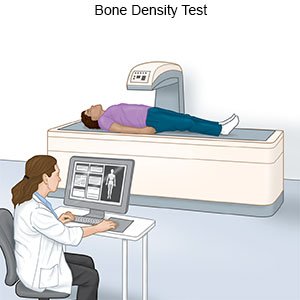Bulimia in Children
Medically reviewed by Drugs.com. Last updated on Aug 4, 2025.
What is bulimia?
Bulimia is an eating disorder that causes your child to binge and purge food. Bingeing means your child eats a large amount of food in a short amount of time. Purging means your child vomits or uses laxatives to get rid of the food. Your child may also exercise for many hours each day or not eat anything at all in between bingeing episodes to prevent weight gain. Bulimia is also called bulimia nervosa.
What increases my child's risk for bulimia?
Bulimia is more common in girls and adolescents. The following may increase your child's risk:
- Being overweight or thinking she or he is too heavy
- Not feeling good about her or his body
- A need to be perfect, or setting high goals
- Participation in a sport or activity that values thinness, such as gymnastics, wrestling, or modeling
- A history of anxiety, depression, or obsessive-compulsive thoughts
- A family history of an eating disorder, obesity, or problems with substance abuse
- Not having good relationships with family members, or stress or trauma
What are the signs and symptoms of bulimia?
- Not being able to stop eating, usually secretly or when she or he is alone
- Spending a long time in the bathroom, especially with water running to cover the sound of vomiting
- Saying she or he is overweight even if her or his weight is healthy or too low, or weight that goes up and down often
- Often being bloated and having constipation or diarrhea
- A sore throat and tooth decay caused by vomiting
- A puffy face and throat, dehydration, or thinning hair
- Calluses or cuts on your child's knuckles if she or he uses her or his hand to make herself or himself vomit
- Monthly periods that are irregular or stop completely
- Feeling cold all the time, or tired, weak, dizzy, or lightheaded
- Being moody and depressed, believing self-worth is tied to weight, or talking about food and weight all the time
How is bulimia diagnosed?
Your child's healthcare provider will check your child's height and weight and ask about recent weight changes. Tell your child's provider what, and how much, your child eats. Your child's provider may ask if your child exercises, what types of exercise, and how much. Your child's provider may ask about any prior treatment or family history of an eating disorder. Your child may have a hard time talking about his or her body. This is okay. Your child's provider may recommend your child talks to an eating disorder specialist. The following tests can help your provider understand how bulimia may be affecting your child's body:
- Blood tests will show if your child is getting enough iron, calcium, and other nutrients. Blood tests will also show how well your child's organs are working, such as the liver and kidneys.
- Urine tests may be used to check for signs of dehydration.
- Bone density pictures may show bone loss that bulimia can cause. Your child's risk for bone loss is higher if she is female and no longer has a monthly period.

- An EKG may be used to check the electrical activity of your child's heart. Bulimia can lead to heart rhythm problems.
How is bulimia treated?
Bulimia is a serious medical condition. Treatment is meant to help your child develop a healthy relationship with food and his or her body image. Your child may also need treatment for health problems caused by bulimia. Your child's providers will work with you and your child to make small, manageable changes.
- Counseling is an important part of treatment. Your child may have group or individual counseling. Group counseling is a way for your child to talk with others who have bulimia. Family sessions can help family members understand bulimia and how to help your child.
- Nutrition therapy means your child will work with providers, such as a dietitian. Others in your family may also meet with the dietitian. Together you will develop a healthy meal plan for your child. It is important for your child to eat 3 to 5 structured meals a day to reduce the urge to binge. Your child might need to learn how to prepare healthy food. Your child might also need to relearn what it feels like to be hungry and full. Your child may be asked to keep a food diary and bring it to future visits.
- Medicines are sometimes used to help treat bulimia or the health problems it causes. Vitamin or mineral supplements may also be needed if your child's nutrient levels are low because of bulimia.
- Care for your child's mouth. Have your child brush her or his teeth or rinse with fluoride mouthwash after vomiting. This will help prevent tooth damage. Choose toothpaste made for sensitive teeth if your child's tooth enamel has been damaged by vomiting. Have your child suck on tart candies to relieve swollen salivary glands.
Treatment options
The following list of medications are related to or used in the treatment of this condition.
Related medications
What can I do to help care for my child?
- Be patient and supportive. Recovery from bulimia is a process that takes time. Your child may have a binging and purging episode after a long period of healthy eating. This is common. Help your child get back on track with healthy eating and healthy exercise. Do not punish your child for the episode. Be available if your child wants to talk about her or his feelings.
- Help your child develop healthy self-esteem. Your child's self-esteem may be tied to her or his weight or appearance. Ask your child what she or he likes about herself or himself. For example, your child may be a talented artist, or may write well. Encourage your child to focus on those skills or talents instead of on appearance. Do not comment on your child's weight or shape.
- Have regular family meals. Your child may be able to help you plan and cook meals. At mealtime, do not focus on your child's choices. For example, do not tell your child to take a larger portion or to go for another helping. Do not criticize your child's choices.

- Spend time doing things your child enjoys. Make family time about being together, not about meals. Try to go to places other than restaurants, movies, and other places that feature food.
- Help your child manage stress. Help your child take a break and rest for 30 minutes every day. Try different ways to reduce stress, such as yoga, meditation, journaling, or spiritual development.
Where can I find support and more information?
- National Eating Disorders Association
165 West 46th Street
New York , NY 10036
Phone: 1- 212 - 575-6200
Phone: 1- 800 - 931-2237
Web Address: http://www.NationalEatingDisorders.org
- National Institute of Mental Health (NIMH), Office of Science Policy, Planning, and Communications
6001 Executive Boulevard, Room 6200, MSC 9663
Bethesda , MD 20892-9663
Phone: 1- 301 - 443-4513
Phone: 1- 866 - 615-6464
Web Address: http://www.nimh.nih.gov/
Call your local emergency number (911 in the US) if:
- Your child says she or he wants to harm or kill herself or himself.
- Your child has pain when she or he swallows, or very bad pain in her or his chest or abdomen.
- Your child's heart is beating very fast or fluttering, or she or he feels dizzy or faint.
When should I seek immediate care?
- Your child's muscles feel weak, and she or he has pain and stiffness.
- Your child cannot stop vomiting.
- Your child vomits blood or sees blood in her or his bowel movements.
When should I call my child's doctor?
- Your child is constipated.
- Your child's hands or feet tingle.
- Your child has pain in her or his teeth, mouth, or gums.
- Your child has new abdominal pain.
- Your female child's monthly period is very light or has stopped completely
- You have questions or concerns about your child's condition or care.
Care Agreement
You have the right to help plan your child's care. Learn about your child's health condition and how it may be treated. Discuss treatment options with your child's healthcare providers to decide what care you want for your child. The above information is an educational aid only. It is not intended as medical advice for individual conditions or treatments. Talk to your doctor, nurse or pharmacist before following any medical regimen to see if it is safe and effective for you.© Copyright Merative 2025 Information is for End User's use only and may not be sold, redistributed or otherwise used for commercial purposes.
Learn more about Bulimia
Treatment options
Care guides
Symptoms and treatments
Further information
Always consult your healthcare provider to ensure the information displayed on this page applies to your personal circumstances.
